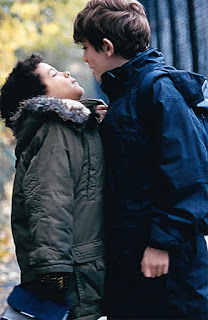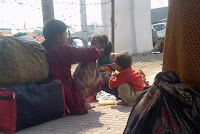While we’re all living on top of each other, or as my grandmother
used to say, ‘living in each other’s pockets,’ I have some hints and tips for
handling close proximity with many people for long time periods.
The situation, the lockdown around the world, has created a
lot of stress for a lot of people who aren’t used to this much contact, for
this kind of duration, in this few locations, with this little relief. Other
cultures and the past have things they can teach us for situations like this.
My own experience was sea time with homeschooling kids: three
of us together (our two girls and me, with dad at work or at sea) nearly all of
the time for the best part of twelve or so years, until they really started spending
a lot more time out of the house on their own longer and longer activities… Not
stuck in the house or in lockdown by any means, but definitely all together more
of the time than most families with similar aged kids.
Privacy in Crowded Places
One interesting piece I read a long time ago (source long
forgotten) was an anthropologist explaining that one of the reasons why people
in places like India, where many people might live in very few rooms, have no
need for the kind of ‘100sq feet of individual privacy behind a door’ that most
people expect everyone in a house to have, is that their manners are quite
different.
The definition of interrupting, for example. Here, ‘interrupting’
is interjecting during someone’s conversation, or talking when someone else is
talking, or seeing that someone is busy doing something and asking or demanding
to move their attention to something else.
This is also true of most everywhere, but some add a piece:
non-responsive people are ‘busy’ even if they appear to be doing nothing: a
member of the household is sitting in one corner of a room staring into space
and someone wants her to answer a question. They approach and speak and she
doesn’t respond.
In my culture, that’s considered to be extremely bad
manners, as one is expected to speak when spoken to, and the rank or age of the
people involved isn’t relevant. In places with very little opportunity for
physical privacy, it’s considered to be extremely rude to interrupt someone who
is having a moment of inward privacy, after the initial approach.
I remember long ago when it was not unusual for even the
media to show this (My Three Sons, Leave it to Beaver, et al), with dad behind
a newspaper; even my own grandfather ‘resting’ in the living room, ‘not
sleeping, checking my eyelids for pinholes.’
Now, with all this openness and
availability where kids and adults are encourage to ask questions directly,
anyone out in the common spaces of a home are considered fair game, we don’t
have the means to make it clear ‘don’t bother me, dude’ without seeming to be
very rude.
Kids, even in public spaces, are expected to respond to total
strangers’ impertinent questions (like ‘how old are you?’ or ‘why aren’t you in
school today?’) when asking the same things back would be considered very rude
(like ‘how old are you, lady?’ or ‘why aren’t you working, old man?’)
This is a novel idea, I think, for many people. Imagine how
different a cubicle farm –sorry, I mean Open Concept Office Space—would be if
everyone understood such a simple piece of etiquette! ‘Oh, Marlan is busy
thinking about something, I’ll come back later…’
For this current situation, all social distancing from
others and staying home as much as possible, it might be a way to approach the
problem of ‘many people who aren’t accustomed to sharing this little space for
this long together…’
Cabin Fever Cures
When the smell of the house and the people in it all become
a bit too familiar, the growing irritation is often called cabin fever, from
when people would be trapped for the winter inside very small space, often with
people used to spending most of the day outdoors, working or playing, with only
one or two indoor workers most of the time (yeah, it was usually mom, or the
camp cook.) There are ways of passing this time that are productive,
interesting, stress-relieving… but spring was looked forward to with a fervour
that is uncommon today even in people who hate snow, winter, or dark grey days.
Sometimes, people would freak out and bolt outside, usually triggered by some small,
repetitive annoyance performed by one of the other residents (sniffing or
chewing too loudly, saying the same mindless phrase one too many times, being
helplessly cheerful in the face of growing annoyance, etc.)
Here, again, the etiquette of more formal societies and more
formal times in history can come to the rescue. Making extraneous noises,
especially body noises, is optional for all but the most disabled of folk, even
if it takes practice to learn and to remember –it’s a relationship-extending
(and sometimes life-extending) effort. Years ago, a comedian would tell a big long
story about how incredibly irritating a partner or someone was, and then turn—as
if to the judge in a courtroom—and say ‘and that’s when I killed them, your
honour.’
Formalities like greeting
people who enter a room, excusing oneself from the table or the room (without explaining,
just saying ‘excuse me for a moment’) to make noises or smells or texts or
phone calls elsewhere, closing the door on an animated phone or zoom
conversation, reducing the volume of the media being enjoyed to the level that others
can’t hear it through the headset, bathing frequently enough not to have a
signature scent precede one into the room, and handling tools and cutlery with
care to minimize the noise, can go a long way to making life in a crowded home
less irritating.
 Decluttering can help,
because visual ‘noise’ is subtly, but very much really, overstimulating and
adds to stress. Even just packing things into boxes or bins can reduce the ‘noise’
in a room enough to make it feel spacious and airy…
Decluttering can help,
because visual ‘noise’ is subtly, but very much really, overstimulating and
adds to stress. Even just packing things into boxes or bins can reduce the ‘noise’
in a room enough to make it feel spacious and airy…
Lowering the actual volume
can help, as can turning off the screens, computers, tablets, lights,
appliances and phones when not in use can make a home remarkably quieter and
less stressful to be in.
Manspread has to be mentioned
as a separate issue: taking up more space than your seat on a many-seat piece
of furniture is hostile in a not-so-subtle way, and it doesn’t lend itself to
peaceful space-sharing with others. When you need to spread out, make yourself
feel big, or ‘really relax’ do so in your bed, in your bedroom alone, or
outdoors. The need is real, meeting it on the only couch that faces the only tv
is not sweet.
This is not a fun vacation or a benign break from real life
for most people, no matter how much they might have asked for one. Even people
who are not overly concerned about themselves or their families contracting this
disease are faced with worries and concerns over an unknown future that no one
can currently predict.
Will the economy recover? Will it collapse? Will
vacationing ever be possible again? Will our company or industry collapse? Will
we be living through another Great Depression or will prosperity like the
Roaring 20s come next? Will we ever be able to have a big wedding, a family reunion,
sporting events or music festivals? Are the concerts or conventions now a thing
of the past? Will there be pro sports again? Olympics?
There are many unknowns and unanswerable questions, today,
and they have been unknown and unanswerable since the earliest mentions of this
virus in the news. For many people, sustained uncertainty is deeply troubling,
affecting their basic sense of security in a safe, healthy, cooperative world.
Children are affected by adults who feel uncertain, and that may lead to
behaviour issues at a time when parents feel least able to support and protect
their emotional well-being.
Add to this, the struggles children of all ages have with
changes –not seeing friends or family, not being able to go to their favourite
playgrounds or parks, missing out on vacations, missing their normal activities
and the people at them, far more time with a wider variety of ages than they
are accustomed to, less privacy than they’re used to, having far more
instruction from teachers than they’re used to, not having the kind of
assistance they get at school …
What Helps
Here is a list of things that may help parents and kids with
all the things:
Empathy and Compassion
Everyone is struggling. The
struggle is real. The more empathy and compassionate understanding parents can
bring to the table, the safer and more emotionally supported everyone will
feel, even with uncertainty, including the parents. Get better at communicating
effectively.
Alternative Work Hours
If you have to live like farmers
or ranchers, with all the kids and adults around the place all day and night
for months on end, it helps to think of ‘work time’ the way people who live
where they have always worked do: lengthen the idea of ‘working hours’ to ‘from
sunup to sundown,’ and build in many, many, many more breaks throughout the
day.
Pomodoro is a great technique for
timing work periods and frequent breaks, which is more suited to the sixteen or
so waking hours, when kids might need something very frequently. Include in the
‘work periods’ all the things that are work: household chores, helping with
homework, meal prep, zoom meetings that are not strictly social. Include as breaks
anything that isn’t work: bathing, jogging or walking, eating, resting, playing
a game, personal care, meditation, exercise, staring at the trees, having a cup
of tea (or a glass of wine, or whatever.)
There are many things to do, and
many things to get done, but relentless response to endless demands to work at
all times is unsustainable. Creating breaks from 2 minutes to half an hour, and
resting and rejuvenating yourself throughout the day will result in more
productivity, more ease, more energy by the end of the day, and a more humane
pace for adults and children to live. If it helps, make a list of ideas for ‘breaks’
if you’re short of creativity at the moment (check out this article for some
ideas:
Consider the Manners
Consideration for others is extremely
important in tense situations, especially situations that drag on and on. Think
about the impact you’re having on others, and be honest about the impact others
are having on you. It is not too much to ask for others to eat more mindfully
(and quietly), to be more aware of the noise they’re making, to be more aware
of the space they’re taking up, and the focus they’re interrupting.
It is also not too much to ask
that adults consider children’s energy, activities and focus with the same respect
as they regard their children’s needs.
Goals Get You Closer
 As someone brilliantly said, ‘there’s
no fun in climbing all the way to the top of the ladder only to find it leaning
against the wrong wall.’ If you don’t know what your goals are, you are very
likely not to make them, however iffy reaching them intentionally might be.
As someone brilliantly said, ‘there’s
no fun in climbing all the way to the top of the ladder only to find it leaning
against the wrong wall.’ If you don’t know what your goals are, you are very
likely not to make them, however iffy reaching them intentionally might be.
That
is: if you get in your car in Calgary and just drive without a map or GPS, and
no idea at all where you’re trying to get to, you may get to the end of a road
somewhere, possibly in the middle of an empty prairie or up against a
mountainside, but it’s unlikely to be a destination on your bucket list.
Family goals might include:
I
want us to all be respectful and kind to each other.
I
want you to be friends as adults, so you need to practice being kind now.
I want you to grow up knowing
that your perspective and emotions are important to me, so we will make room
for all the voices in the house.
I want us to work together as a
team, building each other up rather than tearing each other down.
I want our home life to be
peaceful and respectful.
I want them to grow up knowing
that the answer, at our house, was usually ‘yes.’
That last one is mine. The others
are past and current client’s family goals, and ideas I’ve read elsewhere.
Yours will, of course, be yours, but never thinking about it is putting your
ladder up against any old wall, or driving down any old road. . .
Lead
Children will not spontaneously
create United Nations-level negotiation skills, nor create empathetic listening and
communication skills out of the air. They need loving guidance as they learn to
navigate the complicated world of competing (and sometimes mutually-exclusive)
needs in groups of people beyond themselves.
This means the adults in the
building need to demonstrate:
~
communication skills that aren’t ‘I’m louder than you so shut up’
~
negotiation skills that aren’t ‘I’m bigger and stronger than you, so I get my
way’
~
working together to achieve a shared goal that isn’t ‘because I said so’
~
being the kind of communicator, negotiator, team player they hope their child will
be
Kids learn almost all of the
complex social stuff from watching how other people behave. If you’re currently
struggling to be a good example of how to handle uncertainty, shared space,
competing needs, and big feelings, you can be fairly sure your children will
adopt how you do it, not how you talk about it.
Ask for Help, Do What You Can to Help
 There is help of all kinds
available all over, and (thank you, Alfie Kohn, and the brilliant book No Contest, the case
against competition) cooperation is the nature of humanity: we all need
other people, even the introverts who prefer relationships to be deep, close
and few at a time. People feel good about themselves when they help their
friends and loved ones in ways that really matter.
There is help of all kinds
available all over, and (thank you, Alfie Kohn, and the brilliant book No Contest, the case
against competition) cooperation is the nature of humanity: we all need
other people, even the introverts who prefer relationships to be deep, close
and few at a time. People feel good about themselves when they help their
friends and loved ones in ways that really matter.
Don’t be stingy with your
friends: let them feel great about themselves by asking directly. Give
options, if ‘can you bring me a Starbucks’ sounds too forward or demanding: hey,
I’d love a drive-by coffee date, can you bring one from home or a coffee shop,
or I’ll just make my own and wave at you from my windows… I’d love to see you!
Reach out and help others.
Yes, yes, yes, we’re all terribly
busy and important and have far too much on our plates already, how are
we supposed to cram in helping others, too?
By emptying some of our plates
onto others' (see paragraph starting with ‘don’t,’ above.) Also, by not
doing some of it at all. Just because it’s on your plate doesn’t mean you’re
required to shove it into your life.
It is your life. If you
don’t ever want to bake cookies (or clean up the cookie-baking mess) with your
kids ever again, don’t. You will not get the Bad Dad Prize of the
Century for choosing activities that you also enjoy and drop the ones you
actually hate.
Nobody likes the smell of martyrs and they are very difficult to live with, especially in lockdown. Just stop.
Nobody likes the smell of martyrs and they are very difficult to live with, especially in lockdown. Just stop.
And when you have all that lovely
time and energy left to do something you feel is valuable and important in the
world (and you’re buying your cookies from specialty bakers or the extra-value
shelf at the grocery store, or not at all), select a ‘for someone else’
activity and do it.
Take a coffee to a busy friend.
Ninja your parents with something they’d love –from handmade kid art to fancy
tea or a new book. Ask your neighbour if you can pick up some groceries because
you’re going anyhow. Check your neighbourhood facebook page for requests and
pick something you would enjoy doing anyhow, and do it. Volunteer somewhere
people are needed: a grocery store to pick orders for people who can’t get to
the store, or the food bank, or to drive for medical appointments, or cleaning
the school or, really, whatever you can think of. Call someone you haven’t
talked to in a while. Zoom someone lonely who doesn’t have kids at home, and
just let them watch your busy, noisy house for a while. Send a card to someone
you’re thinking of. Paint a portrait of a friend’s cat. Drive by a friend’s
place and wave, or chat on the phone while you look at each other through the
windows…
There are billions of ways to
help. Pick one.
If You’re Still Struggling
You are not alone. There is help.
Reach out. Be kind to yourself, and know that you deserve kindness, care,
tenderness and soothing. Yes, even you.
Yes, you, too
Call the Need Crisis Line, reach
out online in a therapy group, find out what your benefits cover and access it:
therapy, counselling or written or online resources.
Or talk to a parenting coach
who can help you figure out your goals, help you lead your family toward them, improve
your relationships and connections, and build your (and your kids’)
communication and negotiation skills on the way… my booking calendar is here:































